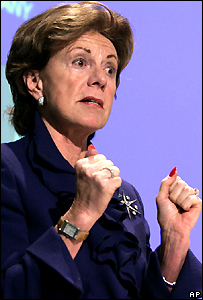 In a speech today before the Internet Governance Forum entitled “Taking Care of the Internet,” Neelie Kroes, Vice President of the European Commission, responsible for the Digital Agenda for Europe, argued for “a globally coherent approach” to preserve “the global character of the Internet, and keep it from fragmenting.” That sounds good in theory but, as always, the devil is in the details. No one wants to see a highly balkanized Internet with each country and continent becoming a digital island cut off from the rest of Internet. On the other hand, if “a globally coherent approach” means layers of international red tape and bureaucracy, then fragmentation doesn’t sound so bad by comparison. That’s particularly true for those of us who live in countries to cherish principles of freedom of speech and free enterprise, as we do in the United States.
In a speech today before the Internet Governance Forum entitled “Taking Care of the Internet,” Neelie Kroes, Vice President of the European Commission, responsible for the Digital Agenda for Europe, argued for “a globally coherent approach” to preserve “the global character of the Internet, and keep it from fragmenting.” That sounds good in theory but, as always, the devil is in the details. No one wants to see a highly balkanized Internet with each country and continent becoming a digital island cut off from the rest of Internet. On the other hand, if “a globally coherent approach” means layers of international red tape and bureaucracy, then fragmentation doesn’t sound so bad by comparison. That’s particularly true for those of us who live in countries to cherish principles of freedom of speech and free enterprise, as we do in the United States.
For example, to most of the rest of the planet, America’s First Amendment is viewed as a pesky local ordinance that simply interferes with the ability of government to establish rules for acceptable speech and expression throughout society. What, then, does “a globally coherent approach” to Internet governance mean when America’s values conflict with other countries and continents? Does it mean that the U.S. should conform to a global norm as established by a “consensus body”? Who would that be? The OECD? The United Nations? The International Telecommunications Union? If so, it is clear that protections for freedom of speech and expression would be sacrificed on the altar of “consensus” or a “coherent global approach” to Net governance.
The same holds true for commercial regulation. The U.S. leaves more breathing room for commercial experimentation and entrepreneurialism than most other governments across the globe. It is likely that a more “globally coherent approach” to Internet governance would lead to a ramping up of regulations governing commercial interactions online.
Thus, there should be some limits to how far we are willing to go in the name of avoiding “Internet fragmentation.” America shouldn’t be ashamed to boast of its superior “light-touch” framework for online policy, and it should defend it against efforts that would force a sort of global regulatory super-convergence and lead to a future that is less free for online denizens.

 The Technology Liberation Front is the tech policy blog dedicated to keeping politicians' hands off the 'net and everything else related to technology.
The Technology Liberation Front is the tech policy blog dedicated to keeping politicians' hands off the 'net and everything else related to technology.